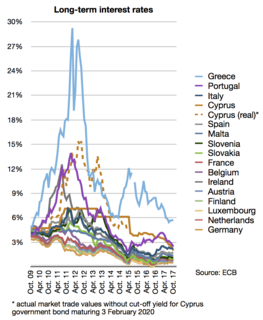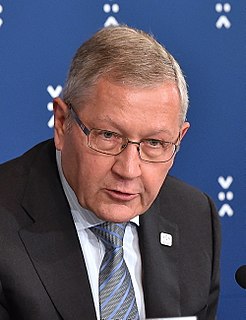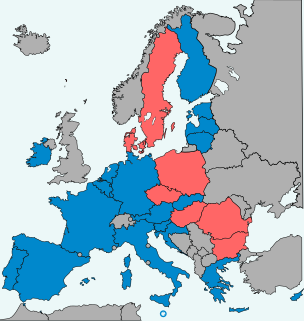
The eurozone, officially called the euro area, is a monetary union of 19 of the 27 European Union (EU) member states which have adopted the euro (€) as their common currency and sole legal tender. The monetary authority of the eurozone is the Eurosystem. The other eight members of the European Union continue to use their own national currencies, although most of them are obliged to adopt the euro in the future.

A quadriga is a car or chariot drawn by four horses abreast. It was raced in the Ancient Olympic Games and other contests. It is represented in profile as the chariot of gods and heroes on Greek vases and in bas-relief. The quadriga was adopted in ancient Roman chariot racing. Quadrigas were emblems of triumph; Victory or Fame often are depicted as the triumphant woman driving it. In classical mythology, the quadriga is the chariot of the gods; Apollo was depicted driving his quadriga across the heavens, delivering daylight and dispersing the night.
Gertrude Tumpel-Gugerell is an Austrian economist, former vice-governor of the Austrian central bank Oesterreichische Nationalbank (1998–2003) and former member of the Executive Board of the European Central Bank. She has been a member of the Council of the University of Leoben.

In the European Union (EU), enhanced cooperation is a procedure where a minimum of nine EU member states are allowed to establish advanced integration or cooperation in an area within EU structures but without the other members being involved. As of October 2017 this procedure is being used in the fields of divorce law, patents, property regimes of international couples, and European Public Prosecutor and is approved for the field of a financial transaction tax.

Peter Gauweiler is a German politician, and a member of Bavaria's Christian Social Union (CSU) formerly in the German Bundestag, where he represented Munich South and served as deputy leader of the CSU. He resigned his parliamentary seat and leadership post in 2015 at age 65. Gauweiler is considered a Euro-sceptic and made a name with partly successful constitutional complaints against the euro bailout fund and the Lisbon Treaty.

Wolfgang Walter Wilhelm Bosbach is a German politician and member of the conservative party, the Christian Democratic Union (CDU), which he joined in 1972. A lawyer by profession, Bosbach is a partner at Winter, Jansen & Lamsfuß in Bergisch Gladbach.

The European debt crisis is a multi-year debt crisis that has been taking place in the European Union since the end of 2009. Several eurozone member states were unable to repay or refinance their government debt or to bail out over-indebted banks under their national supervision without the assistance of third parties like other eurozone countries, the European Central Bank (ECB), or the International Monetary Fund (IMF).

The Economic and Monetary Union (EMU) is an umbrella term for the group of policies aimed at converging the economies of member states of the European Union at three stages. The policies cover the 19 eurozone states, as well as non-euro European Union states.

The European Financial Stability Facility (EFSF) is a special purpose vehicle financed by members of the eurozone to address the European sovereign-debt crisis. It was agreed by the Council of the European Union on 9 May 2010, with the objective of preserving financial stability in Europe by providing financial assistance to eurozone states in economic difficulty. The Facility's headquarters are in Luxembourg City, as are those of the European Stability Mechanism. Treasury management services and administrative support are provided to the Facility by the European Investment Bank through a service level contract. Since the establishment of the European Stability Mechanism, the activities of the EFSF are carried out by the ESM.
Quadriga is a Latin word for a chariot drawn by four horses.

The European Financial Stabilisation Mechanism (EFSM) is an emergency funding programme reliant upon funds raised on the financial markets and guaranteed by the European Commission using the budget of the European Union as collateral. It runs under the supervision of the Commission and aims at preserving financial stability in Europe by providing financial assistance to member states of the European Union in economic difficulty.

Klaus P. Regling is a German economist and current Chief Executive Officer of the European Financial Stability Facility (EFSF) and Managing Director of the European Stability Mechanism. Regling was reportedly considered as a possible head of the European Central Bank to succeed Jean Claude Trichet.

The European Stability Mechanism (ESM) is an intergovernmental organization located in Luxembourg City, which operates under public international law for all eurozone Member States having ratified a special ESM intergovernmental treaty. It was established on 27 September 2012 as a permanent firewall for the eurozone, to safeguard and provide instant access to financial assistance programmes for member states of the eurozone in financial difficulty, with a maximum lending capacity of €500 billion.

The Treaty on Stability, Coordination and Governance in the Economic and Monetary Union; also referred to as TSCG, or more plainly the Fiscal Stability Treaty is an intergovernmental treaty introduced as a new stricter version of the Stability and Growth Pact, signed on 2 March 2012 by all member states of the European Union (EU), except the Czech Republic and the United Kingdom. The treaty entered into force on 1 January 2013 for the 16 states which completed ratification prior to this date. As of 3 April 2019, it had been ratified and entered into force for all 25 signatories plus Croatia, which acceded to the EU in July 2013, and the Czech Republic.

The Eurozone crisis is an ongoing financial crisis that has made it difficult or impossible for some countries in the euro area to repay or re-finance their government debt without the assistance of third parties.

The Treaty Establishing the European Stability Mechanism was signed by the member states of the eurozone to found the European Stability Mechanism (ESM), an international organisation located in Luxembourg, to act as a permanent source of financial assistance for member states in financial difficulty, with a maximum lending capacity of €500 billion. It replaced two earlier temporary EU funding programmes: the European Financial Stability Facility (EFSF) and the European Financial Stabilisation Mechanism (EFSM). All new bailouts of eurozone member states will be covered by ESM, while the EFSF and EFSM will continue to handle money transfers and program monitoring for bailouts previously approved for Ireland, Portugal and Greece.
The Third Economic Adjustment Programme for Greece, usually referred to as the third bailout package or the third memorandum, is a memorandum of understanding on financial assistance to the Hellenic Republic in order to cope with the Greek government-debt crisis.
The Economic Adjustment Programme for Cyprus, usually referred to as the Bailout programme, is a Memorandum of understanding on financial assistance to the Republic of Cyprus in order to cope with the 2012–13 Cypriot financial crisis.
The European troika is a term used, especially in the media, to refer to the decision group formed by the European Commission (EC), the European Central Bank (ECB) and the International Monetary Fund (IMF). The usage arose in the context of the "bailouts" of Cyprus, Greece, Ireland and Portugal necessitated by their prospective insolvency caused by the world financial crisis of 2007–2008.
Pringle v Government of Ireland (2012) C‑370/12 is an EU law case, which held the European Stability Mechanism was lawful.










